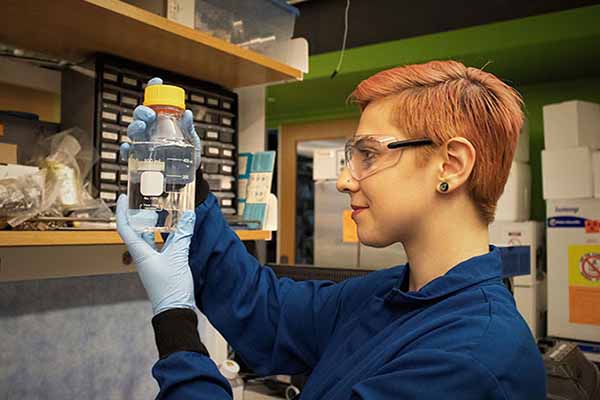Creating a Lasting Impact

Written by Alex Spak, a BS student in bioengineering.
About
Alexandra Spak is an undergraduate student majoring in Bioengineering with a concentration in Cell and Tissue Engineering. She was one of the recipients of the Undergraduate Research and Creative Endeavors (URGCE) Awards in 2018.
Creating a Lasting Impact
I am working on a project that Dr. Ruberti and Dr. DiMarzio received an R21 grant for, entitled Exploring flow-induced crystallization as a critical mechanism driving corneal stromal lamellogenesis. We hypothesize that cell-generated strains will initiate collagen fibril formation by causing molecular alignment and promoting flow-induced crystallization. I am helping to determine if strain rates applied by cells to the extracellular matrix correlate with the quantity and quality of collagen matrix produced.
My specific task is to develop and optimize a protocol to add fluorescently labeled collagen to human corneal fibroblast cells and then image these cells for several hours to observe how they use collagen to build an extracellular matrix.
To do this, I will first be isolating primary human corneal fibroblasts from corneas unsuitable for transplantation, seeding the cells onto delta T dishes, and growing them until confluent. Next, I will be fluorescently labeling human collagen monomers and adding this to the cells daily. I will also be adding ascorbic acid to promote matrix production. After culturing the cells for 2 weeks, I will image the cells for 3 hours at 60X magnification. My goal is to capture the cells incorporating the labeled collagen monomers into their collagen fibrils.
Professor Ruberti, my PI, treats me like a graduate student; he gives me great responsibility and independence to run experiments, establish controls, manage time, order supplies, and ultimately, to develop a protocol from the ground up. Throughout my prior co-op, I only used and optimized previously established protocols. While this was ideal for my skill set at that time, I have grown as a scientist and feel that my work during this co-op is challenging, rewarding, and empowering. It is amazing to me that after I finish, the protocol I develop will continue to be followed by others and used in future experiments.